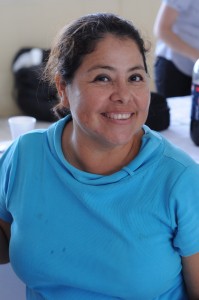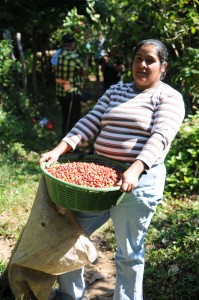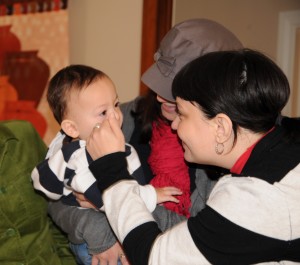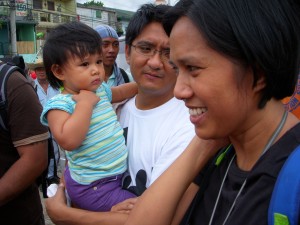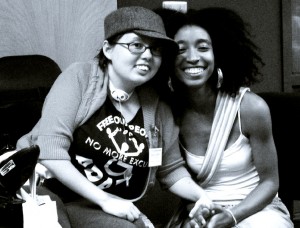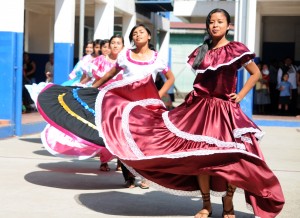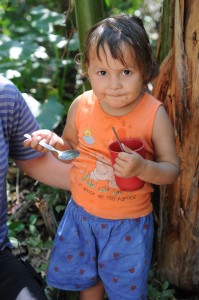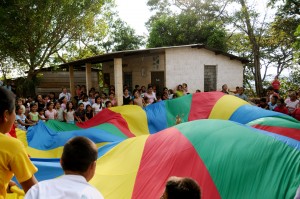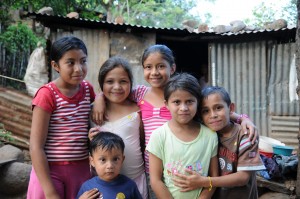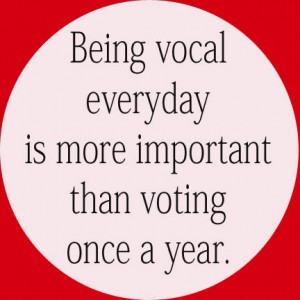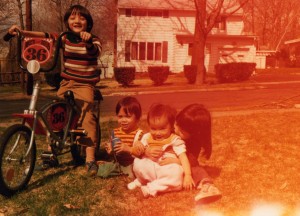I smirked at the wildfire spread of zumba, a mix of latin and international music and dance moves used in group fitness classes, and tossed the idea aside. That is, until this morning, when I found myself standing in the second row of a Saturday morning zumba class.
The lights were dimmed, my body was still sore from a kickboxing class a few days previously, and the room was full. I was fairly confident about my dancing skills. I’ve always hidden my natural love of dance and moved in the privacy of my home. As a little girl, the living room was my stage. Years of cheerleading incorporated tumbling and dance classes and now, with my son in a high chair, I turn the music up loud in the kitchen, and dance for him every morning.
It was a room of all women. All ages from teens to late sixties. There were women of nearly every size and color. Women in regular clothes, workout clothes, even Indian dresses. Hair was swept up in ponytails or loose and free. It was like a small sample of the world’s women. The room was wall to wall mirrors and seeing so many women giggling and practicing different dance moves made me smile.
I tried to remember the last time I danced an organized or choreographed dance with a group of people. Probably since my cheerleading days. Sure I danced at weddings and parties, but nothing in sync. I was doubtful on so many levels if I would enjoy it. Would it be a decent workout? Would I be able to to do the moves? Would I look like an idiot?
Bri, the instructor, made it more than a zumba class. She brought in a quote and announced, “Decide to take action!” I wasn’t sure why she was bringing in quotes – even extras for some of us to take with us – when it was just a fitness class. It would soon make sense, but I had my doubts. “Whatever you are carrying with you, let it out,” she kept exclaiming through the warm-up salsa, through an infusion of hip-hop moves, and energized stretches. “Take action and let it out. Say good-bye and do something else instead. You’re here right now, so be here and let it go.”
Zumba started resembling something like a physical therapy session.
For the next fifty minutes, we moved our hips, legs, arms, and shoulders in rotations, thrusts, punches, and swings in a colorful array of I-don’t-even-know-what. But something happened at the halfway point that I could barely believe.
A room full of strangers, all women, sweating and at first stiff with uncertainty, began to laugh, and loosen up. Perhaps it was bumping our cute booties in the air and Bri exclaiming, “Your body is a wonder, shake it up and love it!” in a non-corny kind of way that helped even the oldest of women try to shake their gluteus maximus high in the air. And then she choreographed a dance that had us bunch together and turn to the side mirrors. She stood in the front, dancing, while we followed, “Look at us!” and as we trod and skipped, jumped and flew our limbs, I stopped and stared. It was an amazing sight. All these women, dancing and smiling in sync. Real women with curves. Real women without coordination. Real women with lines and color and left feet and off beats. It was beautiful. We looked like a flock of birds in rhythm.
And something amazing began to happen. I began to feel lighter and beautiful, like the dance. My feet felt happy. My knees were excited for more. And the women around me started yelping and clapping after each song. The moves became more sensual and Bri began to use imaginative stories, “You step wide into the shower and let the water rinse down your body…” and every women in the room got into the image. Their hands moving from the top of their heads to the sides of their torso. Eyes closed, the music throbbing in our veins.
The energy was something whole and pure, physical and sensual. Our bodies weren’t in sync, but they were alive. My skin was damp, my muscles were warm, and my bones flowed in directions it hadn’t moved in for a long time. Through dance, I found myself smiling at everyone around me and finding smiles in return. The physical became the spiritual.
“Decide to take action today. Whatever it is – a fight you want to let go of, a bad decision, an idea you are sitting on – take action and live today.”
The dimmed lights, 25 women, undeniably infectious music, a positive but not overly cheesy dance instructor, and one quote: Decide to take action today.
At the end of class, after smirking at zumba class, and inward doubts about printed out quotes and dimmed lights, I turned out to be one of the women in line waiting to get a copy of the quote.
